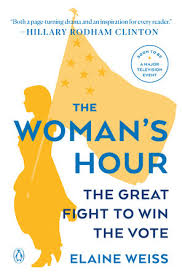Elaine Weiss
Penguin

|
Anne (Dudley) had smashed the Anti’s trusty rationale—that women did not have the right to vote because they were not required to bear arms in warfare—with her poignant reply: “Yes, but women bear armies.” And even the bitterest Anti solon had to admire Anne’s sangfroid when that bomb was tossed through the window while she addressed a suffrage meeting in 1913. “Is that an anti-suffrage bomb?” she asked calmly, peering over the podium, pausing only a few beats. It didn’t explode, so she continued on with her speech. from The Woman’s Hour |
How the unthinkable became inevitable
2020 marks one hundred years since women won the right to vote with the ratification of the Nineteenth Amendment to the U.S. Constitution. It was a long and bitter fight, and even today there are probably some who regret that women were ever permitted out of the kitchen and into politics (see: Pelosi, Nancy.)
In 1776, Abigail Adams urged John to “remember the Ladies” when designing the American democracy. He didn’t—“When the founders wrote ‘We the People,’ they really meant ‘We the White, Wealthy Men.’ Despite much lofty rhetoric, all men were not created equal, and women didn’t count at all.”
In 1848 at Seneca Falls, New York, the first convention was called to propose the radical idea that women be entitled to vote, yet by 1919, the United States was still the only major Western nation that didn’t extend the vote to its female citizens.
The Woman’s Hour tells the stories of the women who struggled to make “an idea once considered unthinkable into something inevitable.” Lucretia Mott, Elizabeth Cady Stanton, Susan B. Anthony, Carrie Chapman Catt, Alice Paul and many others fought through the decades for the nineteenth amendment, finally passed by Congress in 1919. But it still required thirty-six states to ratify it; thirty-five were committed. It all came down to Tennessee in August 1920, and it was not looking hopeful.
Southern states were militantly opposed to the amendment. They wished to protect the dignity and delicacy of womanhood from the coarse, messy world of politics—It would also mean black women could vote, and it was already hard enough dissuading African American men from exercising their right to vote through “voter suppression” measures, like lynching.
A number of Western states had enacted woman suffrage: Wyoming (1869), Colorado (1893), Idaho and Utah (1896)—the argument that women were too “delicate” was probably harder to make where they were out plowing fields, fending off wild animals, and driving buckboards while raising families in their spare time. (Washington State gave women the vote in 1910, Oregon in 1912, the two states once again lagging behind Idaho.)
The strongest and bitterest battles pitted not women against men, but women against other women as they converged on Nashville in that overheated summer of 1920: Carrie Chapman Catt, president of the National American Women Suffrage Association, lead the fight for the “Suffs,” against Josephine Pearson, head of the Anti-Suffragettes, or “Antis,” as they called themselves. It’s a gripping story of formidable women on opposite sides and the men who were caught uncomfortably between them, especially presidential candidate Warren Harding (his wife Florence was a Suff) and President Woodrow Wilson (his wife Edith was an ardent Anti.)
Of course, wherever there is politics, there’s money. The Antis were bankrolled by the liquor and manufacturing interests who feared that women would vote for temperance, child labor laws, better working conditions, and other “socialist” ideas.
Extortion, bribery, even physical threats were common. On the eve of the vote, one farmer-delegate told Joe Hanover, who was leading the floor fight for the amendment, “Sorry, Joe, but I’m going to have to leave you suffrage boys. The Antis just paid me two hundred dollars.” Hanover put his arm around his colleague’s shoulders, saying, “You sold out too cheap. I hear they’re paying the others five hundred.” The legislator was outraged. “Why, them crooked [UNPRINTABLE IN A FAMILY MAGAZINE]! I’m going to vote for you, Joe.”
Weiss creates nail-biting tension as ratification comes down to one vote. (Spoiler Alert: it passed.) The Antis had the votes to defeat it, when 24-year old Harry Burns, the youngest delegate to the legislature, pressured to vote against ratification, received a note from his mother: “Don’t forget to be a good boy and help Mrs. Catt…With lots of love, Mama.” What’s a boy to do?
And the rest, as they say, is historical inevitability.
This review first appeared in The Columbia River Reader (January 10-February 15, 2020.) Reprinted with permission.

